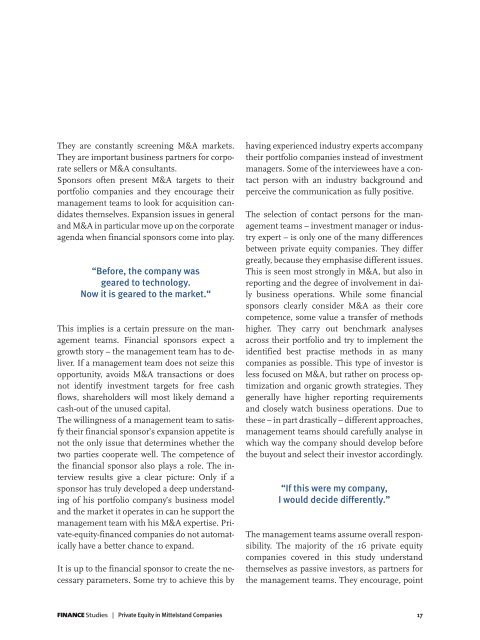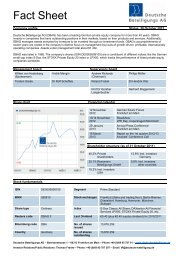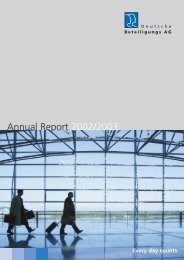FIN A N CE - Deutsche Beteiligungs AG
FIN A N CE - Deutsche Beteiligungs AG
FIN A N CE - Deutsche Beteiligungs AG
Create successful ePaper yourself
Turn your PDF publications into a flip-book with our unique Google optimized e-Paper software.
They are constantly screening M&A markets.<br />
They are important business partners for corporate<br />
sellers or M&A consultants.<br />
Sponsors often present M&A targets to their<br />
portfolio companies and they encourage their<br />
management teams to look for acquisition candidates<br />
themselves. Expansion issues in general<br />
and M&A in particular move up on the corporate<br />
agenda when financial sponsors come into play.<br />
“Before, the company was<br />
geared to technology.<br />
Now it is geared to the market.“<br />
This implies is a certain pressure on the management<br />
teams. Financial sponsors expect a<br />
growth story – the management team has to deliver.<br />
If a management team does not seize this<br />
opportunity, avoids M&A transactions or does<br />
not identify investment targets for free cash<br />
flows, shareholders will most likely demand a<br />
cash-out of the unused capital.<br />
The willingness of a management team to satisfy<br />
their financial sponsor’s expansion appetite is<br />
not the only issue that determines whether the<br />
two parties cooperate well. The competence of<br />
the financial sponsor also plays a role. The interview<br />
results give a clear picture: Only if a<br />
sponsor has truly developed a deep understanding<br />
of his portfolio company’s business model<br />
and the market it operates in can he support the<br />
management team with his M&A expertise. Private-equity-financed<br />
companies do not automatically<br />
have a better chance to expand.<br />
It is up to the financial sponsor to create the necessary<br />
parameters. Some try to achieve this by<br />
<strong>FIN</strong>AN<strong>CE</strong> Studies | Private Equity in Mittelstand Companies<br />
having experienced industry experts accompany<br />
their portfolio companies instead of investment<br />
managers. Some of the interviewees have a contact<br />
person with an industry background and<br />
perceive the communication as fully positive.<br />
The selection of contact persons for the management<br />
teams – investment manager or industry<br />
expert – is only one of the many differences<br />
between private equity companies. They differ<br />
greatly, because they emphasise different issues.<br />
This is seen most strongly in M&A, but also in<br />
reporting and the degree of involvement in daily<br />
business operations. While some financial<br />
sponsors clearly consider M&A as their core<br />
competence, some value a transfer of methods<br />
higher. They carry out benchmark analyses<br />
across their portfolio and try to implement the<br />
identified best practise methods in as many<br />
companies as possible. This type of investor is<br />
less focused on M&A, but rather on process optimization<br />
and organic growth strategies. They<br />
generally have higher reporting requirements<br />
and closely watch business operations. Due to<br />
these – in part drastically – different approaches,<br />
management teams should carefully analyse in<br />
which way the company should develop before<br />
the buyout and select their investor accordingly.<br />
“If this were my company,<br />
I would decide differently.”<br />
The management teams assume overall responsibility.<br />
The majority of the 16 private equity<br />
companies covered in this study understand<br />
themselves as passive investors, as partners for<br />
the management teams. They encourage, point<br />
17










